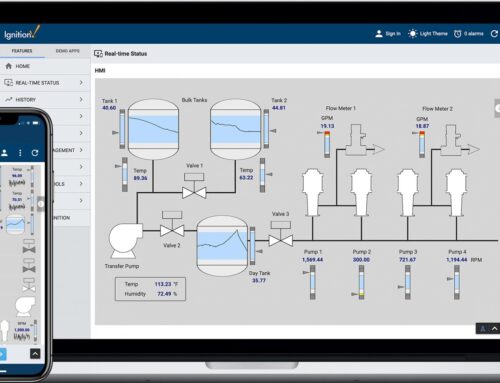introduction: Monitoring Energy Usage in Plastics Manufacturing with Ignition
In the dynamic world of plastics manufacturing, optimizing energy consumption is not only a strategic advantage but also a necessity in moving towards more lasting and cost-effective operations.As the demand for cleaner production processes increases, manufacturers are pressed to innovate and integrate cutting-edge solutions that enhance energy efficiency while maintaining high output quality. This article delves into the pivotal role that Ignition, an industrial automation platform, plays in monitoring and managing energy usage in plastics manufacturing environments.
Ignition provides a versatile and robust framework for overseeing and controlling a wide array of industrial processes. By leveraging its powerful real-time analytics, seamless integration capabilities, and user-friendly interface, plastics manufacturers can gain valuable insights into energy consumption patterns and implement strategies to optimize them. This integration not only reduces operational costs but also significantly contributes to environmental sustainability initiatives by minimizing carbon footprints.
Key Areas Covered:
- Real-time data Acquisition:
– utilize Ignition’s ability to connect with PLCs and energy meters to capture granular energy data across the facility.
– Implement scalable data logging strategies that allow for detailed ancient analysis and trend identification.
- Analytical Tools and Dashboards:
– Develop intuitive dashboards to visualize energy usage patterns and identify inefficiencies.- Deploy advanced analytical tools to forecast energy demands and adjust production schedules accordingly.
- Automated Alerts and reporting:
– Establish automated alert systems to notify operators of abnormal energy consumption spikes.
- Generate comprehensive reports for continuous betterment and strategic planning.
- Case Studies and Examples:
– Explore real-world applications where Ignition has successfully optimized energy management in plastics manufacturing plants.
– Highlight critically important reductions in energy consumption and corresponding cost savings.
As we navigate through the complexities of the manufacturing sector’s energy use, this article aims to provide manufacturers with a detailed roadmap for harnessing the power of Ignition to achieve greater energy efficiency and contribute toward a cleaner, greener industrial future.By integrating Ignition into your energy monitoring strategy,your plant can not only enhance its competitiveness but also align with global sustainability goals,paving the way for a more environmentally conscious manufacturing landscape.
Understanding the Critical Role of Energy Monitoring in Plastics Manufacturing
In the plastics manufacturing industry, energy consumption is undeniably one of the most significant operating costs. Understanding where and how energy is used across various processes can expose inefficiencies, possibly saving both energy and money. as a notable example, extrusion and injection molding machines frequently enough operate around the clock, consuming large amounts of electricity. To tackle this, an smart automation platform like Ignition becomes a crucial ally. ignition’s capability to interface with existing operational technologies, such as Programmable Logic Controllers (PLCs) and Supervisory Control and Data Acquisition (SCADA) systems, enhances visibility into energy consumption patterns. Through real-time data visualization dashboards and historical data storage, plant managers can quickly identify energy hogs and non-essential energy use during machine idling, leading to more informed decision-making.
With Ignition, manufacturers can implement proactive energy monitoring strategies that align with sustainability goals. For example, set alerts that notify plant operators when energy usage exceeds predetermined thresholds. This proactive alerting system can be the nudge needed to ensure the machinery is functioning optimally within its energy consumption parameters. Moreover, analyzing real-time data through Ignition enables the identification of trends and anomalies, crucial for predictive maintenance. By monitoring deviations in energy usage, operators can detect potential issues such as malfunctioning equipment or inefficient processes before thay result in costly downtime. Thus, integrating energy monitoring through an intuitive platform not only optimizes operational costs but also contributes to eco-friendly manufacturing practices by reducing unnecessary energy consumption, ultimately boosting the overall sustainability of the plant operations.
Implementing Ignition for Comprehensive Energy Usage Analysis
Ignition’s powerful capabilities shine in the realm of energy usage analysis within the plastics manufacturing sector. By integrating Ignition’s SCADA platform with existing PLCs and sensors,manufacturers can achieve unprecedented insight into their energy consumption patterns. For instance, real-time monitoring of machinery such as extruders and injection molders allows for the identification of energy-intensive phases within the production cycle. Manufacturers have reported a reduction in energy waste by aligning their operational schedules based on the fluctuating energy rates, leveraging Ignition’s robust data visualization tools to illuminate consumption trends, and setting actionable, event-driven alerts.Additionally, facilities can incorporate Ignition’s scripting capabilities to automatically power down non-critical circuits during peak energy cost times, ensuring operational efficiency without compromising production quality.
real-world case studies underscore the value of implementing Ignition for comprehensive energy management. One prominent plastics manufacturing plant utilized ignition to monitor various energy meters linked to different sections of the plant. With detailed dashboards, operators could quickly identify any anomalies or spikes in usage, facilitating immediate corrective action. Furthermore, Ignition’s seamless integration with industry-standard MES and ERP systems ensures that energy consumption data aligns with production data, providing a holistic view of resource efficiency.This integrated approach not only supports sustainability benchmarks but also fosters a proactive culture of energy conservation and waste reduction, thereby reducing the plant’s overall carbon footprint.
Leveraging Real-Time Data for Energy efficiency and Cost Savings
In the high-stakes world of plastics manufacturing, every watt of energy counts. Through the use of Ignition’s advanced data analytics, manufacturers can access a treasure trove of real-time data directly from their production equipment. This enables the detailed monitoring of energy consumption at each stage of the manufacturing process. By leveraging data from PLCs (Programmable Logic Controllers) and integrating it with Ignition’s HMI/SCADA, operators can identify peak energy consumption periods and analyze the processes contributing to excessive energy use. As an example, a plastics extrusion facility in Ohio used this method to decrease its energy consumption by 15% in just six months. The plant managers discovered that their injection molding machines were running unnecessarily during downtime, enabling them to implement automated shutdown protocols that are now triggered during non-productive periods.
Moreover, real-time data offers predictive insights that allow facilities to optimize their energy usage for cost savings and environmental benefits. By employing Ignition’s capabilities in conjunction with IoT sensors, manufacturers can achieve:
- Dynamic load balancing: Avoid peak demand charges by redistributing energy loads intelligently across machines.
- Enhanced equipment scheduling: Operate machinery based on real-time data to minimize energy expenditure.
- Failure prediction and maintenance scheduling: Utilize IoT sensors to catch anomalies in energy consumption that may indicate impending part failures.
These strategies not only foster improved operational efficiency but also contribute to a cleaner, more sustainable manufacturing process. ignition’s API-friendly architecture makes it straightforward to create comprehensive dashboards and reports, enabling plant managers to make informed, data-driven decisions to drive both economic and environmental benefits.
Recommendations for Integrating Green Technologies into Energy Monitoring Systems
To effectively integrate green technologies into energy monitoring systems within the context of plastics manufacturing, utilizing PLCs in conjunction with Ignition can significantly enhance environmental efficiencies. Ignition, with its powerful SCADA capabilities, can be paired with sensors that measure energy consumption at various stages of production — from extruders to injection molders. These sensors can be established to feed real-time data into Ignition’s centralized dashboard.As a notable example,by implementing a process of continuous monitoring for key metrics,such as power factor,harmonic distortions,or total energy consumption,manufacturers can identify peak usage times and inefficient machines.
Another step toward greener practices involves leveraging predictive analytics.By training machine-learning algorithms within Ignition on historical energy usage data,manufacturers can predict and manage future energy needs more effectively. This can involve functions such as automatically adjusting machine operation schedules to coincide with off-peak energy hours, thereby reducing overall utility costs and environmental impact. Real-world integration examples include using solar energy to power certain elements of the facility and integrating this data into the Ignition platform to provide a comprehensive overview of renewable energy usage versus conventional energy sources. This comprehensive approach not only optimizes energy consumption but also reaffirms a manufacturer’s commitment to sustainable practices.
To Conclude
leveraging ignition for energy monitoring in plastics manufacturing offers a transformative approach to enhancing operational efficiency and sustainability. Key takeaways include:
- Real-time Monitoring: Use Ignition to track energy consumption in real-time across your facility, identifying areas with excessive usage or potential savings.
- Data Integration: Seamlessly integrate energy data with production metrics to correlate energy usage with production cycles and enhance decision-making.
- Sustainability: Minimize your facility’s carbon footprint by optimizing energy usage, aligning with corporate sustainability goals, and reducing overall operational costs.
By adopting these strategies,manufacturers can streamline processes and foster a more sustainable operation. At Innorobix, we are committed to empowering your manufacturing facility with cutting-edge automation solutions. Explore our offerings to revolutionize your energy monitoring processes or request a personalized consultation/demo to learn how we can tailor our solutions to your specific needs.Embrace the future of smart manufacturing with Innorobix and position your company at the forefront of clean tech innovation.

















